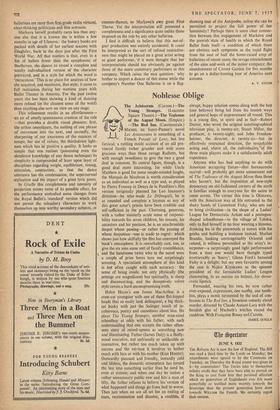Noblesse Oblige
The Aristocrats. (Curzon.)—The Young Stranger. (Leicester Square Theatre.)—The Teahouse of the August Moon. (Empire.) —The Red Inn. (Continentale.)
jooet, Les Aristocrates is something of a French Pursuit of Love, but less farcical; a rattling inside account of an old pro- vincial family rather grander and with more gracious ways than those savage Radletts, but with enough tweediness to give the two a good deal in common. Its central figure, though, is a good deal more interesting, for while Uncle Matthew is good for some simple-minded laughs, the Marquis de Maubrun is worth consideration as an individual as well as a type and, as played by Pierre Fresnay in Denys de la Patelliere's film version (originally planned for Leo Joannon's direction—he who made Le Defroque), he is as rounded and complete a layman as any of this great actor's priests have been credible and self-sufficient in the past. Charming, generous, with a rather sinisterly acute sense of responsi- bility towards his seven children, his tenants, his ancestors and his position, he is an anachronistic despot whose passing—or rather the passing of whose despotism—one is made to regret : which shows just how skilfully the film has conveyed the book's atmosphere. It is remarkably cast, too, to give the six sons some sort of family resemblance, and the handsome twins who in the novel were a couple of prize bores turn out surprisingly amusing. A specialised atmosphere of this kind is not often caught with such accuracy : . the sense of being inside, not only physically (the settings are magnificent) but spiritually, is sharp and disconcerting, and the deceptively velvet style 'covers a hard uncompromising truth.
Helen Hayes's son James MacArthur is a crew-cut youngster with one of those flat-topped heads that so easily look delinquent, a big thick- set husky with just the Salinger touch of in- coherence, poetry and cussedness about him. He plays The Young Stranger, another man-sized schoolboy at odds with his father, with such understanding that one accepts the rather often- seen story of mixed-upness as something new and illuminating. Father (James Daly) is a Holly- wood executive, not unfriendly or unlikeable or insensitive, but rather too much taken up with success and the rat-race it involves to bother much with him or with his mother (Kim Hunter). Outwardly pleasant and friendly, inwardly cold and lifeless, the domestic atmosphere has turned the boy into something surlier than he need be, even at sixteen; and when one day he makes a rather unnecessary public row and hits a man of fifty, the father refuses to believe his version of what happened and things go from bad to worse. Then just when we are all set for an ending of tears, recrimination and disaster, a credible, if abrupt, happy solution comes along with the boy (one believes) being led from his loutish ways and general hope of improvement all round. This is a young film, in spirit and in fact—Robert Dozier, who wrote the original autobiographical television play, is twenty-six; Stuart Millar, the producer, is twenty-eight; and John Franken- heimer, the director, is twenty-six—but its effectively restrained direction, the remarkable acting and, above all, the individuality -of the three main players make it a satisfactorily adult experience.
Anyone who has had anything to do with American occupying forces—that bureaucratic marvel—will probably get more amusement out of The Teahouse of the August Moon than those who haven't; but the imposition of new-style democracy on old-fashioned corners of the earth is familiar enough to everyone for the satire to come across. The corner this time is Okinawa, with the American way of life entrusted to the shaky hands of Lieutenant Fisby, who sets out to bring civilisation—in the shape of a Ladies' League for Democratic Action and a pentagon- shaped schoolhouse—to the village of Tobiko, only to find himself in no time wearing a kimono, drinking tea in the pinewoods at sunset with his geisha and building a teahouse instead. Marlon Brando, looking unrecognisably Oriental and rotund, is wiliness personified as the army's in- terpreter—a surprisingly good light performance from a man one would have thought typed irretrievably as `heavy'; Glenn Ford's harassed Fishy is a delight; but my own favourite among the cast is Nijiko Kiyokawa as the spinster president of the formidable Ladies' League clamouring, in an outsize tin helmet, for demo- cratic lipstick.
Fernandel, wearing his two, by now rather over-exposed, expressions, one toothy, one tooth- less, plays a monk tormented by the seal of con- fession in The Red Inn, a ferocious comedy about murder, directed by Claude Autant-Lara with the fiendish glee of Macbeth's witches round the cauldron. With Francoise Rosay and Carette.
ISABEL QUIGLY


































 Previous page
Previous page